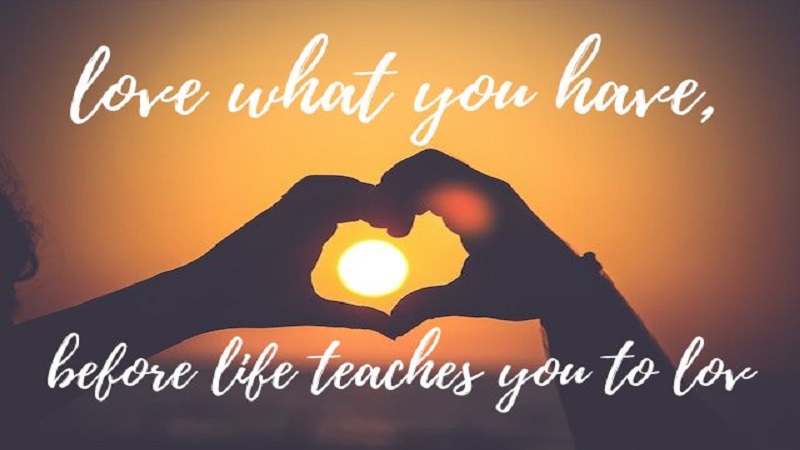Life is a journey filled with countless experiences, both pleasant and challenging. Along this journey, it’s easy to become so focused on what we lack or desire that we overlook the beauty of what we already possess. In this article, we will explore the concept of loving what you have before life teaches you to appreciate it. We’ll delve into the significance of gratitude, the dangers of complacency, and the power of perspective. love what you have, before life teaches you to lov – tymoff
The Value of Gratitude
Gratitude is like a magic elixir for the soul. It’s the art of recognizing and appreciating the positive aspects of your life. Practicing gratitude can bring profound joy and contentment. When we pause to be thankful for the people, experiences, and possessions we have, we find a greater sense of fulfillment.
Learning to Love What You Have
In a world that often encourages us to constantly chase after more, it’s crucial to learn to love what we already possess. This begins with a shift in perspective. Instead of dwelling on what’s missing, focus on what’s present. By acknowledging the beauty of the present moment, we can find happiness in the simplest of things.
The Dangers of Complacency
While learning to love what you have is vital, it’s equally important to avoid complacency. Complacency can stifle personal growth and lead to missed opportunities. It’s a fine balance between contentment and the desire for self-improvement.
The Role of Perspective
Perspective is a powerful tool in our pursuit of contentment. When we view our lives through a positive lens, even challenges can be seen as valuable lessons. A shift in perspective can turn ordinary moments into extraordinary ones.
Counting Your Blessings
One practical way to cultivate a love for what you have is by counting your blessings. Each day, take a moment to reflect on the things you’re grateful for. Whether it’s a loving family, good health, or a warm cup of coffee, these blessings remind us of the richness of our lives.
Practicing Mindfulness
Mindfulness involves being fully present in the moment and appreciating it without judgment. By practicing mindfulness, we can enhance our connection to the present and deepen our love for the here and now.
Nurturing Self-Contentment
Self-contentment is an essential aspect of loving what you have. It’s about being comfortable with who you are and finding happiness in your own skin. Embrace your unique qualities and appreciate yourself for them.
Embracing Imperfection
Perfection is an elusive ideal. Embracing imperfection, on the other hand, can lead to a more fulfilling life. Recognize that it’s okay to have flaws and limitations; they make you uniquely you.
Letting Go of Comparisons
Comparing yourself to others is a surefire way to diminish your self-worth. Instead of focusing on what others have or do, concentrate on your own path and accomplishments. This shift in perspective can foster self-love.
A Grateful Journal
A grateful journal is a fantastic tool for learning to love what you have. It involves writing down the things you’re thankful for daily. Over time, this practice can significantly boost your sense of gratitude.
Expressing Gratitude
Don’t keep your gratitude to yourself. Express it to the people who matter in your life. A simple ‘thank you’ or a heartfelt note can brighten someone’s day and deepen your relationships.
Paying It Forward
Acts of kindness and generosity can be powerful expressions of gratitude. By giving back to your community or helping those in need, you’ll not only spread positivity but also increase your own sense of fulfillment.
Coping with Challenges
Challenges are an inevitable part of life. Instead of resenting them, view them as opportunities for growth. When you learn to appreciate the lessons that challenges offer, you’ll grow stronger and more resilient.
Conclusion
In conclusion, loving what you have is a choice that can lead to a more joyful and fulfilling life. Gratitude, a positive perspective, and mindfulness can transform your outlook on life and help you cherish the present. So, before life teaches you the value of what you have, make the conscious choice to love it. love what you have, before life teaches you to lov – tymoff
Frequently Asked Questions
1. How can I start practicing gratitude in my daily life? Practicing gratitude is simple. Each day, take a moment to reflect on the things you’re thankful for. You can write them down or simply acknowledge them in your mind.
2. What’s the difference between contentment and complacency? Contentment is finding happiness in the present, while complacency is being too comfortable and resistant to change.
3. Can I learn to love what I have even if I’m facing challenges? Absolutely. Challenges offer valuable lessons. By embracing them and learning from them, you can still find love and gratitude in your life.
4. How can I maintain a positive perspective during difficult times? Maintaining a positive perspective during tough times can be challenging but is possible. Focus on your resilience, your ability to learn, and the strength you gain from overcoming obstacles.
5. Why is expressing gratitude to others important? Expressing gratitude to others not only brightens their day but also deepens your relationships. It’s a powerful way to strengthen connections with people who matter to you.

